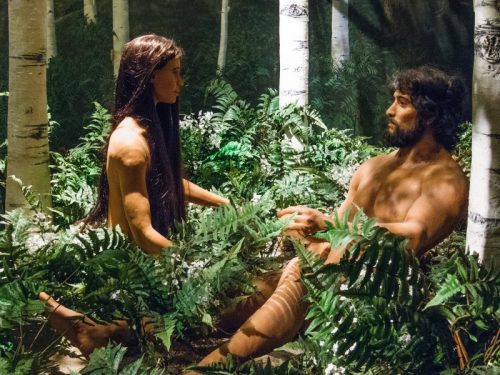
Adam and Eve as portrayed at the Creation Museum Kentucky illustrating John Troyer’s presentation.
There’s some interesting stuff going on in the world of academia which can go unnoticed in the frenzied world of Facebook updates and Twitterfeed, and yesterday the GFG took a few hours out to go and listen to some learned folk exploring religious responses to contemporary western death practices at the Centre for Society and Death at the University of Bath.
Introduced by good friend of the GFG Professor Tony Walter, the seminar was attended by an eclectic mixture of academics, undergraduates, postgraduates, eminent experts and interested others. Which we think included us. We put our hands up for that anyway.
Tony started things off with a paper on four ways that religions interact with society’s death practices – promotion, opposition,accommodation and compensation. In a compelling canter through illustrations of various ways different religions interact and influence with societies around the world, Tony touched on Mizuko Kuyo, monotheism’s opposition to ancestor worship, Nepalese Christianity, Madagascan death rituals , the popularity of spiritualism post WW1 and the lack of channels for grief provided in Protestant countries that have perhaps led to the development of bereavement memoirs, bereavement counselling and the association of green spaces and nature with soothing of grief.
Next to speak was Dr. Shirley Firth, presenting a paper on outdoor funeral pyres and the legal battle that began ten years ago when devout Hindu Babaji Davender Ghai was refused permission for a traditional open air pyre by Newcastle City Council. Four years later the Court of Appeal ruled that an outdoor pyre would be lawful if it took place in a structure with walls and an opening in the roof – see here. To date, none have. This could be because of the complexity of the various legal processes that would be involved in gaining planning for outdoor cremation given the likely invocation of the Prevention & Control of Pollution Act or the Environmental Protection Act. Undeterred, Mr Ghai continues to hope for his funeral to take place according to his beliefs, see here.
(As a completely irrelevant aside, readers of the blog with fond memories of THAT scene from the BBC’s Pride and Prejudice may be interested to know that Dr. Firth’s son is the one and only Colin Firth. We didn’t realise this yesterday.)
Third up was Dr. Mansur Ali from Cardiff University, presenting early results from his research into the response from Muslims in Cardiff to the Human Transplantation (Wales) Act 2013 which is now enacted. Dr. Ali has explored the feelings and beliefs about organ donation among the Islamic community through interviews and focus groups with Islamic scholars, medical professionals and an online survey, and the impact of presumed consent that results from the Act. Entitled ‘Our Bodies Belong to God’, Dr. Ali’s fascinating presentation explored the conflict experienced for Muslims when considering transplantation of organs from or to a body that is considered the property of God and not of oneself. He outlined some of the questions that arose such as ‘if my corneas are donated to someone whose sight is restored as a result but who then goes on to watch pornography (a sin according to Islam), does this make me also a sinner?’ Results from his findings are of significant interest, and he hopes to gain funding for much more comprehensive research.
The afternoon was rounded off by Dr. John Troyer, Director of CDAS who explored the fundamental Christian response to end of life planning in the United States. Definition of when death occurs, who has the right to determine life or death and the influence of fundamental Christianity were covered in a broad ranging presentation – protests by Christian groups outside the hospital where Terri Schiavo’s persistent vegetative state was allowed to end in death (despite attempted intervention by President George Bush and his brother Jeb Bush, then governor of Florida), and the lack of support of hospice care from some sections of the Christian Fundamentalist movement illustrated his points, and he ended with a slide showing a placard from the current presidential election campaign stating ‘1st choice for President – God, 2nd choice – Jesus, 3rd choice Trump.’
And on that rather terrifying note, the seminar was over.


Sorry I missed it Fran – sounds like an interesting day. I think the lack of channels for grief that Tony Walter picked up on is a really serious need to address in modern funerals, I have long felt that the Church of England doesn’t do this well (I speak as an Anglican minister) but I fear that the trend in civil ceremonies is also towards focusing on celebration, not grief. I think the key to a good funeral is to hold both in tension and allow both to be expressed and find liturgical (used in the widest meaning of… Read more »
Blimey…..so instead of priests or Civil Ceremony celebrants we are now to have chanting from a group wearing Winiama masks?
I am off to pseuds’ corner for a bit of comprehensible sanity.
My comment of October 18th was posted in reply to a very silly rant which has since been removed. My response should have been taken down at the same time, but it wasn’t. The effect is, now, that I appear to have replied to, and in criticism of, the Rev’d Mr Brooks and this is very regrettable.
I hope that this comment may last long enough for Mr Brooks to see it by way of explanation. After that perhaps an alert administrator/editor might remove that of the 18th and this one?